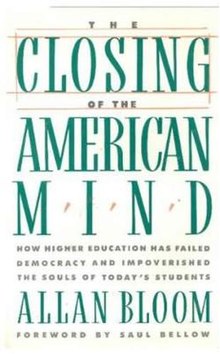The Closing of the American Mind

Cover of the first edition
|
|
| Author | Allan Bloom |
|---|---|
| Country | United States |
| Language | English |
| Subject | Education, philosophy, social criticism, cultural criticism, politics |
| Published | 1987 (Simon & Schuster) |
| Media type | Print (Hardcover and Paperback) |
| Pages | 392 |
| ISBN | |
The Closing of the American Mind is a 1987 book by the philosopher Allan Bloom, in which the author argued that "higher education has failed democracy and impoverished the souls of today's students." He focused especially upon the "openness" of relativism as leading paradoxically to the great "closing" referenced in the book's title. In Bloom's view, "openness" and absolute understanding undermine critical thinking and eliminate the "point of view" that defines cultures. Bloom's book became an unexpected best seller, eventually selling close to half a million copies in hardback, but drew divided reactions from reviewers.
Bloom critiques the contemporary American university and how he sees it as failing its students, criticizing modern movements in philosophy and the humanities. Philosophy professors involved in ordinary language analysis or logical positivism disregard important "humanizing" ethical and political issues and fail to pique the interest of students. Literature professors involved in deconstructionism promote irrationalism and skepticism of standards of truth and thereby dissolve the moral imperatives which are communicated through genuine philosophy and which elevate and broaden the intellects of those who engage with these imperatives. To a great extent, Bloom's criticism revolves around his belief that the "great books" of Western thought have been devalued as a source of wisdom. Bloom's critique extends beyond the university to speak to the general crisis in American society. He draws analogies between the United States and the Weimar Republic. The modern liberal philosophy, he says, enshrined in the Enlightenment thought of John Locke—that a just society could be based upon self-interest alone, coupled by the emergence of relativism in American thought—had led to this crisis.
For Bloom, this created a void in the souls of Americans, into which demagogic radicals as exemplified by '60s student leaders could leap. (In the same fashion, Bloom suggests, that the Nazi brownshirts once filled the gap created in German society by the Weimar Republic.) In the second instance, he argued, the higher calling of philosophy and reason understood as freedom of thought, had been eclipsed by a pseudo-philosophy, or an ideology of thought. Relativism was one feature of modern liberal philosophy that had subverted the Platonic–Socratic teaching.
...
Wikipedia
